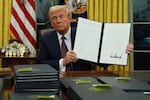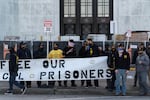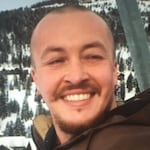
President Donald Trump holds up an executive order commuting sentences for people convicted of Jan. 6 offenses in the Oval Office of the White House, Monday, Jan. 20, 2025, in Washington.
Evan Vucci / AP
Shortly after being sworn in as president Monday, Donald Trump pardoned or commuted the sentences of around 1,500 people who had been convicted of crimes related to the Jan. 6, 2021 riot at the U.S. Capitol.
The move, according to the Associated Press, will allow people who violently attacked police officers and even those convicted of seditious conspiracy to walk free. Facing questions from reporters in the Oval Office, the president justified the action by invoking familiar foils: Portland and Seattle.
“We’ve got to give them a break,” Trump said with a pen in hand as he signed various executive orders on his first day in office. “What they’ve done to these people is outrageous.”

Members of the Proud Boys, a violent, far-right extremist group, gather in front of the Oregon State Capitol on January 8, 2021 in Salem, Oregon. About 50 people turned out for a rally to support incarcerated participants in the Jan. 6 insurrection.
Jonathan Levinson / OPB
Since the attack on the U.S. Capitol, which interrupted the certification of the 2020 presidential election, the U.S. Department of Justice has prosecuted hundreds of people for a variety of crimes, ranging from misdemeanors like trespassing to serious offenses like sedition.
Trump justified his decision by claiming that prosecutors took a lighter touch with activists aligned with racial justice protests in 2020.
“What happened in Seattle where they took over a big portion of the city? What happened in Portland where they burned down the city every day and people die?” Trump said. “Nothing happened to anybody, but they go after these people violently.”

A file photo of Aaron Danielson distributed by the Portland Police Bureau. Danielson was killed at a 2020 protest in Portland following years of political street clashes during the first Trump administration.
Portland Police Bureau / Portland Police Bureau
While not entirely clear who Trump was referencing that died in Portland, it was likely a reference to Aaron “Jay” Danielson, an armed protester who was shot and killed by a self-identified antifascist in the city in 2020. Danielson was the one person who died in Portland as the national political climate leading up to that year’s presidential election collided with months of protests against police violence.
Trump’s statement Monday that “nothing happened to anybody” related to those protests or actions is false. The U.S. Marshals Service, acting after calls from Trump to find Danielson’s killer, shot and killed the man believed to be responsible — Michael Reinoehl — on Sept. 3, 2020, less than a week after Danielson’s own death. Numerous people in both Portland and Seattle were also prosecuted for vandalism, arson and more serious crimes related to 2020 protests.

In this screenshot from a video interview, Michael Forest Reinoehl claimed that he was shot in the arm during a skirmish at a July 2020 protest in Portland. Law enforcement killed Reinoehl while attempting to arrest him for the death of Aaron Danielson.
Screenshot attained by OPB/ProPublica / OPB
Both Portland and Seattle were regular talking points of President Trump during his first administration, a focus that only became more prominent after Trump deployed federal officers to Portland in the summer of 2020 to quell racial justice demonstrations that often devolved into violent conflicts with law enforcement.
With Trump pardoning or commuting the sentences of people who participated in the Jan. 6 riots, extremism experts have openly wondered if activists who favor the president — many of whom traveled to Oregon and Washington for violent conflicts with leftist demonstrators — will be emboldened toward further political violence over the next four years.
